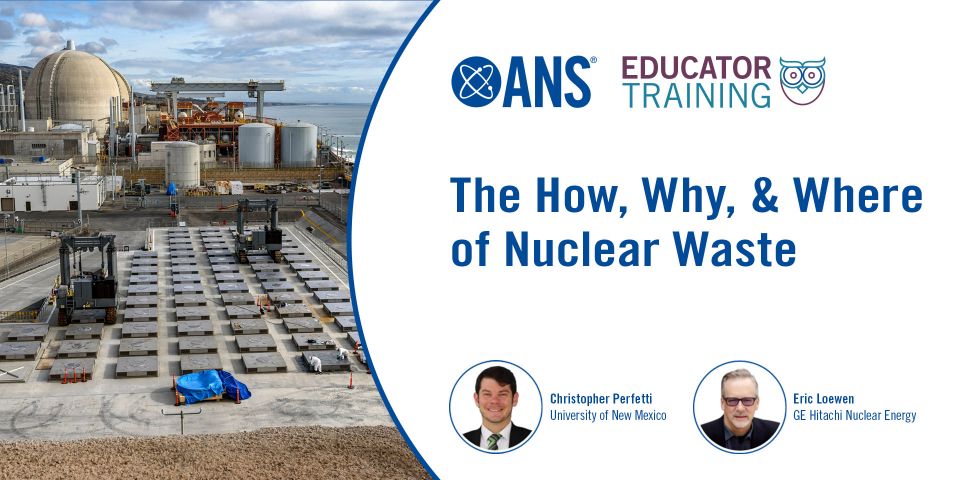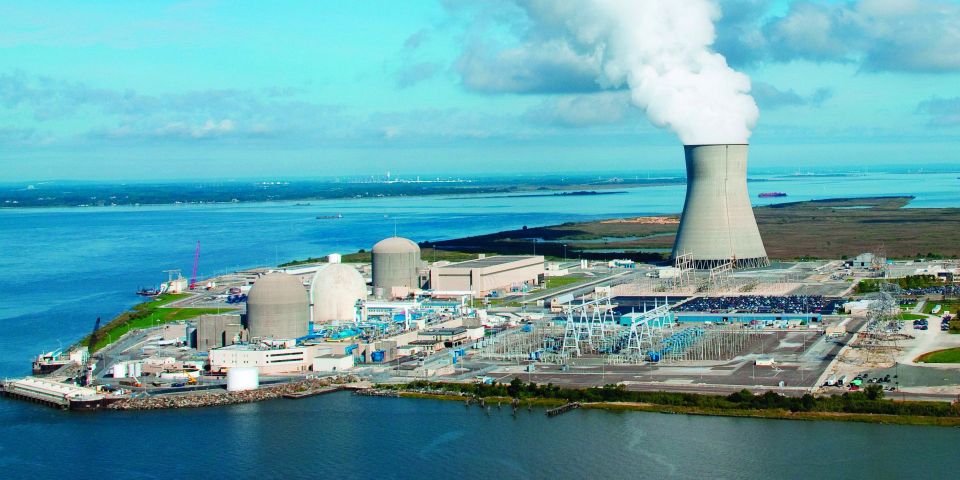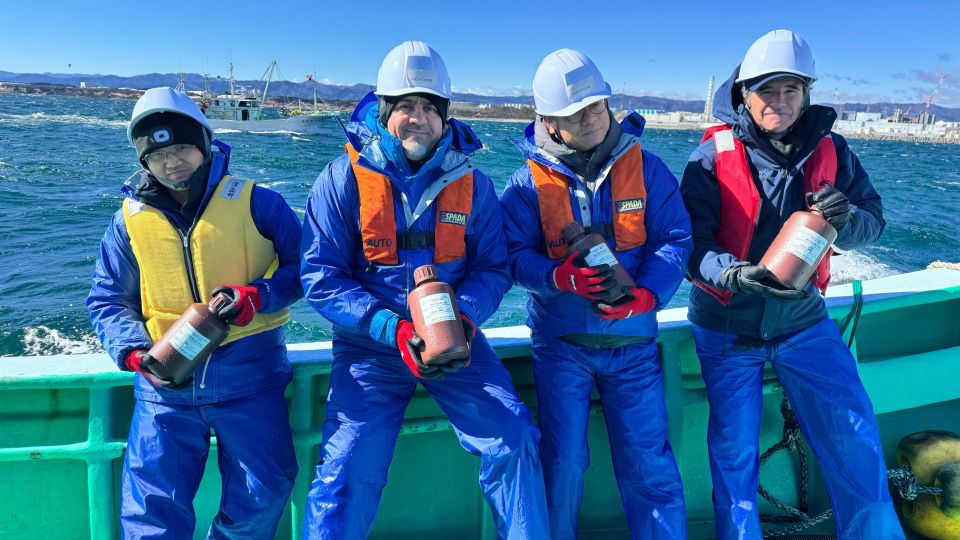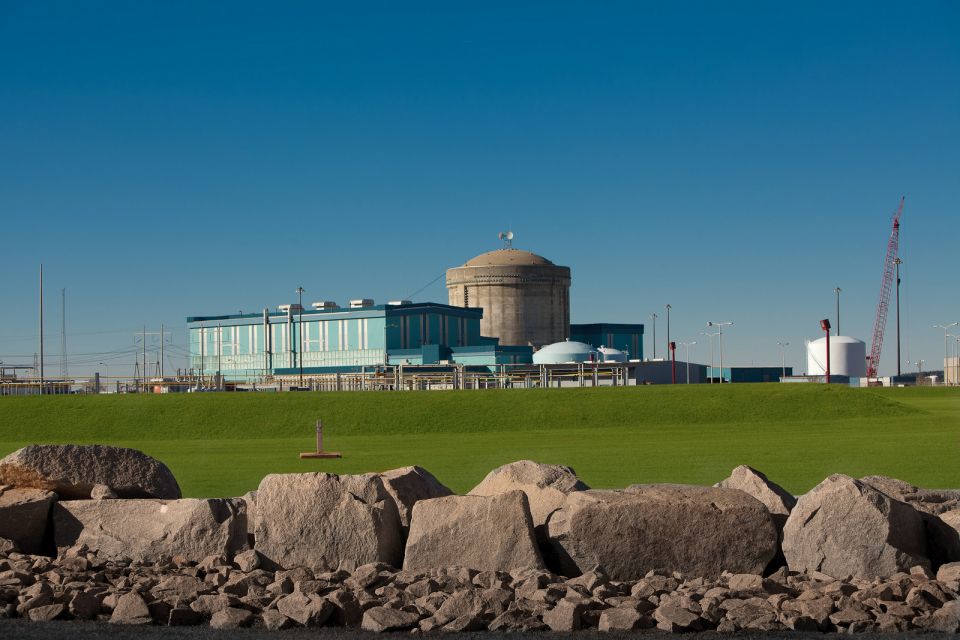The party platforms on energy–and nuclear
 Both the Republicans and the Democrats have recently released their party platforms. Here's a look at what each platform has to say about energy and environmental issues in general, and on nuclear specifically.
Both the Republicans and the Democrats have recently released their party platforms. Here's a look at what each platform has to say about energy and environmental issues in general, and on nuclear specifically.
Republicans on energy
 The Republican party platform favors an "all-of-the-above" energy strategy that involves responsible development of all our energy resources, and results in a domestic, secure energy supply that is stable, reliable, and affordable. Other general goals of the strategy include the creation of jobs, spurring economic growth, lower energy prices, and a strengthened domestic energy industry. The platform states that it does not support, however, policies that "pick winners and losers" through government intervention in the energy industry.
The Republican party platform favors an "all-of-the-above" energy strategy that involves responsible development of all our energy resources, and results in a domestic, secure energy supply that is stable, reliable, and affordable. Other general goals of the strategy include the creation of jobs, spurring economic growth, lower energy prices, and a strengthened domestic energy industry. The platform states that it does not support, however, policies that "pick winners and losers" through government intervention in the energy industry.
With respect to environmental regulations, the platform is generally opposed to federal environmental regulations and the Environmental Protection Agency, preferring regulation by the states as well as an approach to achieving environmental goals that is more cooperative (vs. punitive) with industry.
With respect to coal, the platform support the development of new "environmentally responsible" coal plants, as well as research and development into clean coal technology and technologies to convert coal into liquid fuel or gas (that can be cleanly burned). The platform states that it is opposed to President Obama's "war on coal", since there is no economic replacement for coal (the largest electricity source) and reductions in coal use will result in the loss of large amounts of jobs in that sector. It states that the GOP is opposed to any type of carbon dioxide-limiting legislation such as cap-and-trade. It also opposes the EPA's regulation of greenhouse gases, and supports legislation that specifically bars the EPA from doing so. It also appears to be generally opposed to stricter limits on other coal pollutants as well.
With respect to oil and gas, the platform claims that the use of imported oil is undesirable in that some of the money sent overseas may wind up in the hands of nations, or other groups, that want to harm the United States. The main response, favored in the platform, is the opening up of offshore areas, federal lands, and the Arctic National Wildlife Refuge to oil and gas development. In addition to reducing oil imports and increasing energy security, the platform states that the resulting domestic oil and gas development will result in large numbers of new jobs. It also explicitly states its support for the Keystone XL oil pipeline (from Canada to refineries in the United States) for similar reasons, and it criticized Obama for opposing the pipeline. It also expressed support for natural gas fracking and opposed new federal regulations on the practice, saying that state regulations are sufficient.
The platform touched briefly on renewable energy, stating that it supports the development of renewable energy in general, but that it was opposed to government loan guarantees for renewable projects. It instead favors a "market based approach" to renewable energy development. (Not in the platform is that most Republicans also oppose extension of the wind energy tax credit, one of the most significant federal renewable energy subsidies.)
Democrats on energy
 The Democratic party platform does not have a section on energy per se. Its policies related to energy can be found in the section on the environment. The discussion on energy is shorter in general than it is in the Republican platform, and it generally does not discuss specific energy sources.
The Democratic party platform does not have a section on energy per se. Its policies related to energy can be found in the section on the environment. The discussion on energy is shorter in general than it is in the Republican platform, and it generally does not discuss specific energy sources.
The platform states that protecting the environment is a top priority for the party, and touts Obama's investments in clean energy and the administration's efforts to protect the environment. It states that Obama has made the most significant strides in decades to cut pollution, citing the increase in the fuel efficiency standard for vehicles as an example. It specifically talks about many of the pollutants that primarily arise from coal-fired power plants and states that they are a significant threat to health. It states that clean energy development will be a significant source of domestic jobs. It also highlights Obama's (first time ever) proposed limits on CO2 for new power plants.
Much of the platform's discussion relates to climate change (global warming). It affirms the party's belief that global warming is a problem, calling it "one of the biggest threats of this generation-an economic, environmental and national security catastrophe in the making". It says that the administration (and party) will combat global warming by exercising leadership on the issue abroad, while using "market and regulatory solutions" to reduce emissions at home. It argues that domestic reductions are necessary to show leadership on the issue, which is essential to getting a global agreement to reduce emissions.
Specifically, the platform states that the administration will continue diplomatic efforts to work toward an international agreement to limit/reduce emissions. At home, Obama and the Democrats will continue to invest in clean energy, and will take steps (both legislative and regulatory) to reduce domestic emissions. Regulatory measures include the (already passed) vehicle gas mileage standard and the (proposed) EPA regulations that limit CO2 from new power plants (effectively requiring CO2 sequestration for any new coal plant). Possible legislative efforts would include cap-and-trade, some kind of CO2 tax, or the proposed Clean Energy Standard for getting ~80 percent of electricity from "clean" sources by 2035. None of these legislative options are specifically mentioned in the platform, however, with discussion of specific CO2 limiting policies such as cap-and-trade being conspicuously absent.
In another section of the platform, it states that global warming also represents a "real, urgent and severe" national security risk, arguing that it will result in increased geopolitical conflicts over resources (e.g., water) and refugees, will result in suffering from drought and famine (creating potential instability in various regions), and increased frequency and severity of natural disasters.
Finally, the platform criticizes the Republican party (and candidate), stating that the GOP doubts the science of climate change and wants to roll back regulations protecting our air and water. It also states that the Republicans do not recognize the benefits of the Clean Air and Clean Water Acts, and do not recognize the jobs created by clean energy development.
Nuclear energy
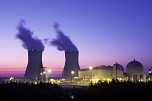 In a relatively brief (two paragraph) discussion, the Republican platform expresses support for nuclear energy, saying that it "must be expanded". It calls for timely review of new reactor license applications by the Nuclear Regulatory Commission. It also raises the waste issue, stating that federal government's failure to address storage and disposal of spent fuel has cost "the States and taxpayers" a lot of money. It calls for a "more proactive" approach for managing spent fuel, which includes the development of advanced reprocessing technologies. Mention of Yucca Mountain is conspicuously absent.
In a relatively brief (two paragraph) discussion, the Republican platform expresses support for nuclear energy, saying that it "must be expanded". It calls for timely review of new reactor license applications by the Nuclear Regulatory Commission. It also raises the waste issue, stating that federal government's failure to address storage and disposal of spent fuel has cost "the States and taxpayers" a lot of money. It calls for a "more proactive" approach for managing spent fuel, which includes the development of advanced reprocessing technologies. Mention of Yucca Mountain is conspicuously absent.
The Democratic platform is completely silent on nuclear energy. Although the platform generally does not mention specific energy sources (as I said earlier), it also does not touch on any policies or proposals that would affect nuclear in any way.
Who's better for nuclear?
While the Republicans have generally had kinder words for nuclear than the Democrats, it's less clear whether or not Republican policies would be more helpful to the industry. In general, it appears that while Republicans may be more helpful in the area of waste, Democratic policies such as CO2 limits (and stricter limits on fossil fuel pollution in general) would do more to make nuclear more economically competitive with fossil fuels.
Waste issues
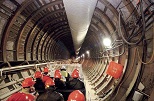 In the area of waste, it would be hard to do worse than the Obama administration, with the shameful termination of the Yucca Mountain licensing process, and the (political) suppression of the results of the NRC staff's essentially finished licensing review (which virtually everyone knows was about to approve the repository). The administration also appointed not one but two NRC chairmen whose opposition to Yucca Mountain was clearly the primary basis for their selection. On the other hand, would the Republicans be much better? Given that Yucca is not mentioned at all in their platform, it appears that they are not willing to stand up for the repository (or the completion of the licensing process, at least) either.
In the area of waste, it would be hard to do worse than the Obama administration, with the shameful termination of the Yucca Mountain licensing process, and the (political) suppression of the results of the NRC staff's essentially finished licensing review (which virtually everyone knows was about to approve the repository). The administration also appointed not one but two NRC chairmen whose opposition to Yucca Mountain was clearly the primary basis for their selection. On the other hand, would the Republicans be much better? Given that Yucca is not mentioned at all in their platform, it appears that they are not willing to stand up for the repository (or the completion of the licensing process, at least) either.
My view is that the waste issue does not impact nuclear's competitiveness, since the cost of storing the waste, even over a long time period, is very small-on the order of 0.1 cents/kW-hr. The primary impact of the continued delay in resolving the waste issue is that it strengthens and extends the false notion, held by much of the public, that nuclear waste disposal is an intractable problem with no technical solution. This, in turn, results in increased opposition to the construction or continued operation of nuclear plants. For this reason, I've advocated the completion of Yucca's licensing process, even if the project itself is not continued, since it will show the public that we had a technically sound solution. I personally doubt that alternative solutions-such as the reprocessing discussed by the Republicans, which involves going back to the drawing board and pushing resolution of the issue decades into the future-will have much positive impact.
All that said, it's not clear that public opposition to nuclear over the waste issue is all that big a factor, in the grand scheme of things. It has not led to much increased opposition to specific projects, especially in the Southeast, where most new plants are proposed. The biggest obstacle to new nuclear plants is clearly economic competitiveness (with fossil fuels, especially gas).
Economic competitiveness
 The Republicans made a vague statement about expediting the NRC review of new reactor projects, but specifics, and any real impact, remains to be seen. One would hope that now that the initial license applications (e.g., Vogtle and Summer) have been approved, follow-on applications would go pretty quickly. In any event, a somewhat faster approval process will not help nuclear's competitiveness that much. (The cost of the licensing process is more of an issue.)
The Republicans made a vague statement about expediting the NRC review of new reactor projects, but specifics, and any real impact, remains to be seen. One would hope that now that the initial license applications (e.g., Vogtle and Summer) have been approved, follow-on applications would go pretty quickly. In any event, a somewhat faster approval process will not help nuclear's competitiveness that much. (The cost of the licensing process is more of an issue.)
On the other hand, policies that would significantly reign in fossil fuels' privilege of just dumping massive amounts of pollution (including CO2) into the environment, for free, would significantly increase nuclear's competitiveness in the future. I've always believed that nuclear will never stand much of a chance if it is required to completely contain all of its wastes/toxins (with even the small possibility of release being something that has to be avoided, almost regardless of cost), while its competitors have nowhere near the same requirements.
Policies that would aid nuclear's competitiveness (in addition to being the right thing to do) would be taxing or limiting CO2 emissions, reducing allowable emissions levels for other toxic pollutants (e.g., particulates, mercury, etc.), classifying coal ash/sludge as a hazardous material, and doing something to more adequately regulate gas fracking, which currently enjoys an exemption from the Clean Water and Safe Drinking Water Acts (I believe).
The EPA's proposed policy that effectively bans new coal plants that don't employ CO2 sequestration would have a huge impact over the long term. Although it would mainly result in the replacement of coal with gas over the shorter term, it would greatly help nuclear over the long term, since it would increase gas demand (leading to higher natural gas prices). I (and many others) also believe that the current gas glut will not last forever, and that renewables will never be capable of providing most (let alone all) of our power generation.
It's clear which party would be better in this regard. Many in the Republican party are actually calling for pollution regulations to be rolled back, let alone be improved. The GOP platform clearly states that it will block any attempts to tax or limit CO2, prevent or reverse the EPA's proposed policy on new coal plants, and oppose any regulations on gas fracking. With fossil fuels getting such a (continued) free ride, and the regulatory playing field remaining so unlevel and unfair, it is hard to see nuclear being competitive in the future.
Some may argue that global warming policies will not happen anyway, so having more reasonable treatment of nuclear in the waste area, as well as (perhaps) better NRC appointments, would make the Republicans better for nuclear, over the next presidential term. My personal view is that the EPA's new coal plant rule alone, not to mention not having air pollution regulations rolled back, is more than enough to offset those benefits, in terms of the overall climate for nuclear.
Nuclear's influence?
My general view is that the Republicans primarily support fossil fuels while the Democrats primarily support renewables. Both are now supporting gas, to some degree. Neither party supports nuclear to any significant degree.
This is due to a profound lack of influence in Washington by the nuclear industry, compared to other energy industries. Recently, some have tried to suggest that the industry (Exelon Corp., specifically) has had significant influence with Obama, due to campaign contributions and its presence in Illinois. This view is absurd. Here's a question: What is the ONLY major energy source that was NOT mentioned at all in Obama's Democratic convention speech? He (the Democratic candidate) even made brief mention of "clean coal", but didn't mention nuclear at all.
Due in large part to this lack of influence, the current regulatory playing field is heavily slanted against nuclear, with nuclear's requirements being orders of magnitude more strict than those applied to fossil fuels (as measured by dollars spent per unit of public health and safety benefit, etc.). Five years ago, it seemed like things were finally moving in a more fair, balanced direction, with the prospect of CO2 limits, etc., but now things seem set to get even worse.
We have the NRC considering adding even more regulation, and arguing that current regulations are insufficient since the Fukushima event inflicted significant economic costs, even though the public health impacts have been very small-much smaller than what NRC had always assumed the consequences of a severe meltdown would be (i.e, current regulations were always based on the assumption that such an event would be vastly more harmful). Meanwhile, we hear calls from the right side of the political spectrum, to reign in or even eliminate the EPA, with no similar calls for the NRC. Humble proposals to merely reduce the ~20,000 annual deaths, in the United States alone, from fossil plant pollution are loudly decried, while nuclear requirements are being increased even further, in a quest to reduce even the chance of the release of pollution to even more negligible levels, without any fanfare or political resistance (even from the industry itself).
Nuclear's complete lack of political influence, and the overly powerful influence of other sources such as coal, is starting to be examined in some quarters-a recent article by William Tucker being one example.
If our industry does not find a voice, its future does not look bright. We will continue to have policies such as Renewable Portfolio Standards (that mandate the use of large amounts of renewable energy, regardless of cost or practically) on one side, while continuing to allow fossil fuel plants to freely pollute on the other. The tremendously unlevel regulatory playing field between nuclear and fossil sources will remain, or get even worse.
_______________________________________

Hopf
Jim Hopf is a senior nuclear engineer with more than 20 years of experience in shielding and criticality analysis and design for spent fuel dry storage and transportation systems. He has been involved in nuclear advocacy for 10+ years, and is a member of the ANS Public Information Committee. He is a regular contributor to the ANS Nuclear Cafe.



